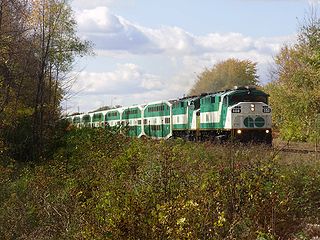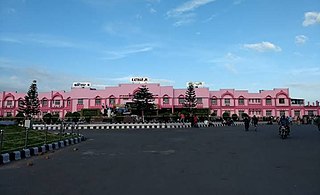
Kharagpur is a semi-planned urban agglomeration and a major industrial city in the Paschim Medinipur district of West Bengal, India. It is the headquarters of the Kharagpur subdivision and the largest city of the district. It is located 120 km west of Kolkata. Kharagpur holds the oldest and biggest Indian Institute of Technology namely IIT Kharagpur. It has one of the largest railway workshops in India. Kharagpur Junction contains the fourth longest railway platform in the world and is the headquarter of the Kharagpur Division of the South Eastern Railways.

The New York Connecting Railroad or NYCR is a rail line in the borough of Queens in New York City. It links New York City and Long Island by rail directly to the North American mainland. Amtrak, CSX, Canadian Pacific Kansas City, Providence and Worcester Railroad and New York and Atlantic Railway (NYAR) currently use the line. It runs from the Hell Gate Bridge over the East River to Fresh Pond Junction yard in Glendale in Queens. It was completed in 1917. Amtrak uses the northernmost section of the line from Sunnyside Junction in the Woodside section of Queens to the Hell Gate Bridge into the Bronx from which it follows the line north to Boston.

Lakeshore East is one of the seven commuter rail lines of GO Transit in the Greater Toronto Area, Ontario, Canada. It extends from Union Station in Toronto to Oshawa GO in Durham Region. Buses from Oshawa connect to communities further east in Newcastle, Bowmanville and Peterborough.

The Main North Line is a major railway in New South Wales, Australia. It runs through Strathfield to Wallangarra. The line was the original main line between Sydney and Brisbane, however this required a change of gauge at Wallangarra. As of 1988, the line closed progressively north of Armidale with services gradually withdrawn till 2004, with the main route between Sydney and Brisbane now the North Coast line.

Grand Chord is part of the Howrah–Gaya–Delhi line and Howrah–Prayagraj–Mumbai line. It acts as a link between Sitarampur, (Asansol), and Pt. Deen Dayal Upadhyay Junction,, previously known as Mughalsarai Junction, and covers a stretch of 450.7 km (280.1 mi). The Coal India Corridor line that branches off from Dhanbad Junction and rejoins the Grand Chord at Son Nagar Junction is another major coal loading hub. It is a fully electrified, quadruple line section from Pt. Deen Dayal Upadhyay to Son Nagar and double line section from Son Nagar to Sitarampur. There are plans to triple the lines from Son Nagar to Dhanbad to accommodate the increasing traffic.. The entire line lies under the jurisdiction of three divisions, Mughalsarai railway division, Dhanbad railway division and Asansol railway division. The Grand chord section is the lifeline of the country, 2nd busiest railway section of India after Ghaziabad, Uttar Pradesh to Pt. Deen Dayal Upadhyay Junction, Uttar Pradesh Main Line section, on which coal, steel and other important goods are moved from Eastern section to Western and Northern sections of the country. In the down direction, the traffic consists of mostly food grains, fertilizers and empty wagons for coal loading in the Jharkhand and West Bengal coal fields. Pt. Deen Dayal Upadhyay Junction is a transit division and the main objective is to maintain mobility of high density traffic. The present capacity of the Grand Chord is being optimally utilized. Traversing through Chota Nagpur Plateau of Jharkhand as well as parts of the fertile Gangetic plains of Bihar, the Grand Chord covers a stretch of 450.7 km (280.1 mi). The Grand Chord is renowned for its remarkable controlling of passenger traffic, despite being burdened with freight traffic.

The Dry Creek–Port Adelaide railway line is an eight-kilometre east–west freight railway line running through Adelaide's north-western suburbs. The line is managed by the Australian Rail Track Corporation (ARTC) and is an important link between Port Adelaide, Pelican Point and the main interstate rail routes which link Adelaide with Melbourne, Perth, Darwin and Sydney. Prior to 1988, a limited local passenger service operated, stopping at five intermediate stations along the line. Since May 1988, the line has been freight-only.

Frankford Junction is a railroad junction, and former junction station, located on the border between the Harrowgate neighborhood of Philadelphia and Frankford, Philadelphia. At the junction, the 4-track Northeast Corridor line from Trenton connects with the 2-track Atlantic City Line from Atlantic City in the northeastern portion of Philadelphia about 2.9 miles (4.7 km) northeast of North Philadelphia station. It lies near the intersection of Frankford Avenue and Butler Street, to the west of the interchange between Interstate 95 and the approach to the Betsy Ross Bridge. It has been used for rail transportation since 1832 but has not served as a station since October 4, 1992.

The East Indian Railway Company, operating as the East Indian Railway, introduced railways to East India and North India, while the Companies such as the Great Indian Peninsula Railway, South Indian Railway, Bombay, Baroda and Central India Railway and the North-Western Railway operated in other parts of India. The company was established on 1 June 1845 in London by a deed of settlement with a capital of £4,000,000, largely raised in London.

The Sahibganj loop is a railway line connecting Khana Junction and Kiul Junction. Originally a part of the Howrah–Delhi main line, it was opened to traffic in 1866. With the construction of a shorter railway line for a part of the route, the 403.8 kilometres (250.9 mi) stretch was assigned a separate identity.

The Gaya–Pandit Deen Dayal Upadhyaya Junction section, formerly Gaya–Mughalsarai section , is a railway line connecting Gaya Junction and Pandit Deen Dayal Upadhyaya Junction. This 197-kilometre (122 mi) track is part of the Grand Chord, Howrah–Gaya–Delhi line and Howrah–Prayagraj–Mumbai line. This section includes Arrah-Sasaram and Son Nagar branch lines. It is under the jurisdiction of East Central Railway.

The Sealdah–Ranaghat–Gede line connects the Sealdah Main and North terminus of Kolkata with Ranaghat and Gede of Nadia district of West Bengal, India. Once a part of the old Calcutta–Siliguri main line, today it is a busy suburban section of the Kolkata Suburban Railway's Sealdah North section connecting the North 24 Parganas and Nadia districts with Kolkata. It is under the jurisdiction of the Sealdah railway division of the Eastern Railway zone of the Indian Railways.

The Ranaghat–Krishnanagar City–Lalgola line is a 155 km (96 mi) long broad gauge railway line which connects Ranaghat Junction in the Nadia district with Lalgola in the Murshidabad district of the Indian state of West Bengal. The line runs up to the Bangladesh border near the Ganga river and is a part of the Sealdah railway division of the Eastern Railway zone.
Sealdah South section consists of a set of four lines which connect the Sealdah South station in Kolkata with its southern suburbs and with the South 24 Parganas district of West Bengal, India. It is a part of the Kolkata Suburban Railway and is under the jurisdiction of the Sealdah railway division of the Eastern Railway zone of Indian Railways.

Rewari Junction railway station, station code RE, is a major railway station of the Indian Railways serving the city of Rewari in the Indian state of Haryana. It is in the Jaipur Division of the North Western Railway zone and lies on the Delhi–Ajmer–Ahmedabad route. Six railway lines branch out from this railway station. The seventh railway line from Rewari will be laid as a dedicated freight railway line as a part of the Western Dedicated Freight Corridor.

Katihar Junction railway station serves Katihar city in Katihar district in the Indian state of Bihar. It is an A Category railway station of Katihar Division. The Katihar Junction railway station is connected to most of the major cities in India by the railway network.
The Western Dedicated Freight Corridor or Western DFC is a 1,506 km long, under-construction 1,676 mm freight corridor in India. It will connect Dadri in Uttar Pradesh with Jawaharlal Nehru Port in Navi Mumbai, Raigad District, Maharashtra. The corridor is being built by the Dedicated Freight Corridor Corporation of India Limited (DFCCIL), a public-sector unit (PSU) under the Ministry of Railways and would be electrified with double-line operation. The Western DFC entails a new single-line branch from Prithla in Palwal district to Tughlakabad in Delhi, running parallel to the existing New Delhi–Faridabad–Palwal railway line.

Eastern Dedicated Freight Corridor or Eastern DFC is a broad gauge freight corridor in India. The railway will run between Ludhiana in Punjab and Dankuni in West Bengal via Meerut and Khurja in Uttar Pradesh. This railway line is one of the multiple freight corridors being constructed by the Dedicated Freight Corridor Corporation of India (DFCCIL), a public-sector unit (PSU) under the Ministry of Railways.

The Calcutta Chord linkline, also known as the C.C. link line, is a 22 km (14 mi) long branch line of the Kolkata Suburban Railway which comes under the jurisdiction of Eastern Railway's Sealdah Division & Howrah Division.

Karachi–Peshawar Railway Line is one of four main railway lines in Pakistan, operated and maintained by Pakistan Railways. The line begins from Karachi City station or Kiamari station and ends at Peshawar Cantonment Station. The total length of this railway line is 1,687 kilometers (1,048 mi). There are 176 railway stations from Kiamari to Peshawar Cantonment on this line. The line serves as the main passenger and freight line of the country. 75% of the country's cargo and passenger traffic uses the line. The line will undergo through a six-year 6.8 billion us dollar upgrade and renovation as part of the China Pakistan Economic Corridor, with an average rail speed expected to be doubled to 140 kilometers per hour upon completion. The railway track is dual between Karachi and Shahdara Bagh, Chaklala and Golra Sharif

The Barkakana–Son Nagar line is an Indian railway line connecting Barkakana and Son Nagar on the Gaya–Mughalsarai section of the Grand Chord. This 313-kilometre (194 mi) track is under the jurisdiction of East Central Railway.




















